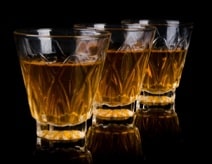The first thing we are going to do is know the etymological origin of the term at hand. In this case, we have to point out that it is a word that derives from Latin, exactly emanating from "liquor, liquoris", which is used to refer to any liquid product.
Liqueur is an alcoholic beverage that is produced by mixing, macerating and/or distilling different substances . It generally has a herbal or fruit flavor, depending on its composition.
Among the words that can function as synonyms for liquor we find some such as alcohol, ambrosia, beverage, trinque, nectar, broth or brew, among others.
 The origins of the liquor are linked to medicinal plants . In the Middle Ages , alchemists and physicists prepared concoctions with the intention of generating various benefits for the body. Primitive liquors were also made by monks .
The origins of the liquor are linked to medicinal plants . In the Middle Ages , alchemists and physicists prepared concoctions with the intention of generating various benefits for the body. Primitive liquors were also made by monks .
Due to the variety of preparation methods and ingredients , liqueurs are very varied. Even the differences with other types of spirits tend to be somewhat diffuse.
There are liqueurs that are obtained by infusing plants or fruits in alcohol or water. Others are made by incorporating extracts and essences. The usual thing is that they have a high level of sugar and that their alcohol content is between 15º and 50º .
According to the combination of alcohol and sugar, it is possible to distinguish between extra dry liqueur , dry liqueur , sweet liqueur , fine liqueur and cream liqueur . There are people who drink it with dessert or after food, although it can also be used for cooking or preparing cocktails.
Other interesting information about the liquor are the following:
-The stores specialized in its sale respond to the name of liquor store.
-Liquor is a drink that can be drunk alone, after lunch or even dinner, or it can be part of the list of ingredients that give shape to a cocktail or mixed drink.
Amaretto , curaçao , and triple sec (or triple sec ) are some of the most popular liqueurs. Others are famous through their commercial name, such as Cointreau (orange liqueur), Strega (herbal liqueur) and Tía María ( coffee liqueur). It should be noted that there are liquors that are produced industrially and others, artisanally.
In addition to those already indicated, there are other well-known internationally known liqueurs such as the following:
-The brandy, which is well known in Spain and in some Latin American countries. It usually has between 40 and 45 degrees and can be obtained from fruits such as grapes, for example, and even cereals.
-Cachaça, which is a brandy with a certain resemblance to rum that is obtained from sugar cane and is very popular in Brazil and even in Portugal.
-The cream punch. It is a liquor that has its origin in Venezuela and whose main ingredients are milk, cane liquor and eggs.
